 Petzlover
Petzlover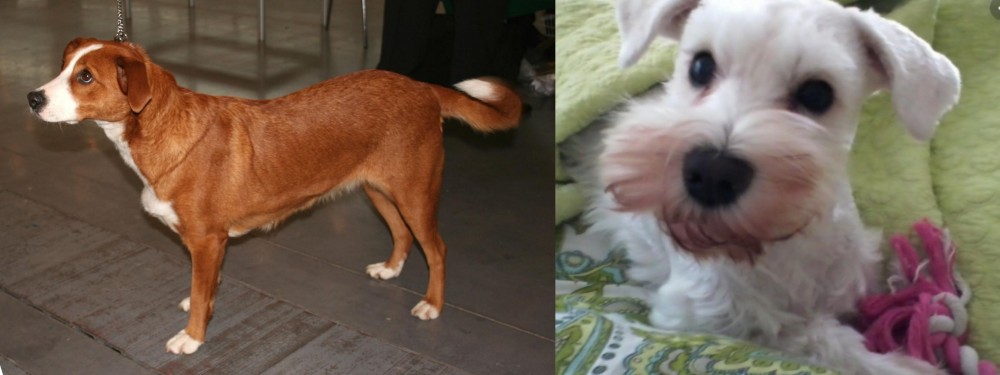 Austrian Pinscher is originated from Austria but White Schnauzer is originated from Germany. Austrian Pinscher may grow 14 cm / 6 inches higher than White Schnauzer. Austrian Pinscher may weigh 11 kg / 25 pounds more than White Schnauzer. Both Austrian Pinscher and White Schnauzer has same life span. Both Austrian Pinscher and White Schnauzer has almost same litter size. Austrian Pinscher requires High Maintenance. But White Schnauzer requires Moderate Maintenance
Austrian Pinscher is originated from Austria but White Schnauzer is originated from Germany. Austrian Pinscher may grow 14 cm / 6 inches higher than White Schnauzer. Austrian Pinscher may weigh 11 kg / 25 pounds more than White Schnauzer. Both Austrian Pinscher and White Schnauzer has same life span. Both Austrian Pinscher and White Schnauzer has almost same litter size. Austrian Pinscher requires High Maintenance. But White Schnauzer requires Moderate Maintenance
 The Australian pinscher exists from the early nineteenth century in Australia. They were originally breed and raised to be great family pet and the guard of the property. They don’t have the gene for a hunting and that’s why they were kept close to the family. Since they were thought to live in areas where they can roam and run free, they have a high daily need for the activity.
The Australian pinscher exists from the early nineteenth century in Australia. They were originally breed and raised to be great family pet and the guard of the property. They don’t have the gene for a hunting and that’s why they were kept close to the family. Since they were thought to live in areas where they can roam and run free, they have a high daily need for the activity.
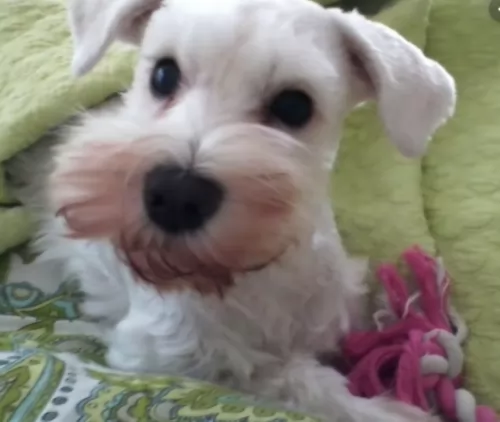 The White Schnauzer was established in Germany in 2006 for people looking for this particular breed of dog but in white.
The White Schnauzer was established in Germany in 2006 for people looking for this particular breed of dog but in white.
The traditional color is salt and pepper. It seems that breed societies don’t allow the white breed, saying they don’t conform to the ideal breed standard.
The White Schnauzer is officially recognized in Germany, If you have a White Schnauzer you may not be able to show him with some of the major kennel clubs.
White is one of the four color varieties of the Miniature Schnauzer and it is also recognized by the Fédération Cynologique Internationale.
 The Australian pinscher, medium sized dog breed, with strong and solid body muscularity, is a happy dog with generally very positive personality. They don’t weight much, and they have usually athletic bodies because they are very active dog kind. Their head is built as a roundish triangle with wrinkled wide forehead and strong cheekbones. They have strong scissor bite and usually darker lips. They have brown or golden brown lively eyes, medium to small ears that fit perfectly to the head size. Their tails are most of the time happy and up in the air, usually fluffy because of the longer hairs on the tails.
The Australian pinscher, medium sized dog breed, with strong and solid body muscularity, is a happy dog with generally very positive personality. They don’t weight much, and they have usually athletic bodies because they are very active dog kind. Their head is built as a roundish triangle with wrinkled wide forehead and strong cheekbones. They have strong scissor bite and usually darker lips. They have brown or golden brown lively eyes, medium to small ears that fit perfectly to the head size. Their tails are most of the time happy and up in the air, usually fluffy because of the longer hairs on the tails.
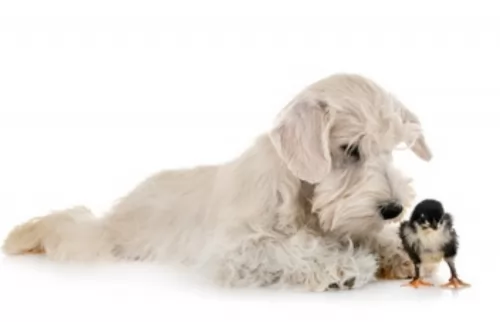 There are a number of different types of White Schnauzer. The white Schnauzer is actually one of 4 color varieties and these dogs are always miniature Schnauzers.
There are a number of different types of White Schnauzer. The white Schnauzer is actually one of 4 color varieties and these dogs are always miniature Schnauzers.
You won’t easily find a Standard- or Giant dog in white. They aren’t albinos, as the skin does have some pigment.
These dogs also have that square-shaped build and they stand between 28 to 36 cm in height and weigh between 4 and 7kg.
The coat is wiry with a soft undercoat. The ears are often cropped to stand erect, but if left they are half-erect, half-floppy and fold forward.
The White Schnauzer is an intelligent dog who will be able to be socialized and trained easily.
He is an energetic little dog and very playful and will get along well with children, loving the games they provide and loving to spend time with all members of his family.
He is loving and affectionate and is willing to share his home and people with other dogs too. He will make you a good watchdog, perhaps encouraged because of his reserve with strangers.
If you provide him with the right amount of mental and physical stimulation, he can become a balanced dog with an amicable personality.
 If you decide to have an Austrian pinscher as a pet in a family with small children, you will make a great choice. Their playful nature and energetic behaviour have been accepted by the children very well. They have an affectionate attitude towards their family, and they will be the great watchdog for your children.
If you decide to have an Austrian pinscher as a pet in a family with small children, you will make a great choice. Their playful nature and energetic behaviour have been accepted by the children very well. They have an affectionate attitude towards their family, and they will be the great watchdog for your children.
Guarding a farm, large yard, animals on the farm or in a yard. Guarding and playing with children, long runs or long bike rides. They will follow you anywhere.
Since they are great with the family and children as well, they can’t be rated with a five-star grade for stranger friendliness and other dog’s friendliness. Sure, they can be trained to be very socialized if you have the time and the patience, but if you don’t you shouldn’t be surprised if they are generally not stranger friendly. It’s their nature. They are devoted only to the family and they usually have a hard time when their family leaves them. This breed is not advisable to be kept indoors or with the seniors that don’t move much.
The Austrian pincher's ability to learn fast and be trained quickly is not super good. They do well – they will listen to their owners always but they are not so great when it comes to learning trick for fun. They will be more than happy to run to catch the ball, but they won’t give it back because they can play alone. They can be learnt to do the basic things, but their lovable and playful nature will overall and they will end up asking for an ear scratch or a belly rub.
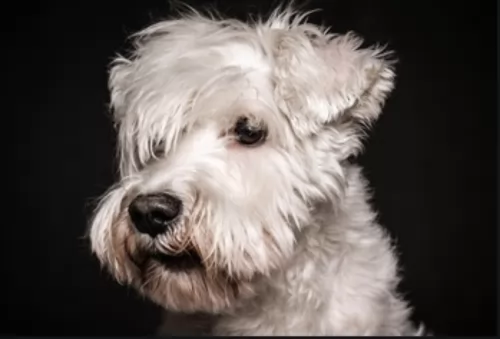 The White Schnauzer is such an adaptable little dog and he will happily adapt to life in the city or in the countryside, just so long as he is close to his human companions and gets sufficient exercise.
The White Schnauzer is such an adaptable little dog and he will happily adapt to life in the city or in the countryside, just so long as he is close to his human companions and gets sufficient exercise.
He is a sociable dog that just loves to be around his human family and won’t like to be separated from them for too long.
He makes a great family dog when you provide him with the right food, a warm dry place to sleep, exercise and lots of love and attention.
 They usually have no health issues like skin irritations, problems with eyes or ears, but they need to be groomed regularly because they shed a lot. They don’t need the regular baths, but when you do bathe them, take a good care of washing and rinsing their thick undercoat. Keep their ears clean and their claws tidy, and you will be happy together. There is a normal percentage of the joint injuries and heart malfunctions due to the increased activity. But, if you take a good care of your Austrian Pinscher, you wouldn’t have to worry about this at all.
They usually have no health issues like skin irritations, problems with eyes or ears, but they need to be groomed regularly because they shed a lot. They don’t need the regular baths, but when you do bathe them, take a good care of washing and rinsing their thick undercoat. Keep their ears clean and their claws tidy, and you will be happy together. There is a normal percentage of the joint injuries and heart malfunctions due to the increased activity. But, if you take a good care of your Austrian Pinscher, you wouldn’t have to worry about this at all.
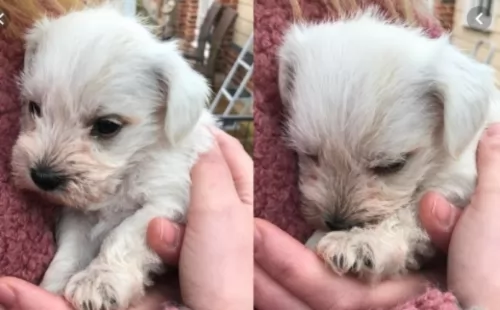 While he is a spunky, robust type of dog, there are always going to be some health concerns to look out for.
While he is a spunky, robust type of dog, there are always going to be some health concerns to look out for.
Kidney stones may well not cause your pet the same pain that humans endure, but they are still a cause for concern. A kidney stone that gets too large and lodges in the ureter becomes a ureterolith. This can be very painful, resulting in pain and even vomiting.
The kidney can even swell and become damaged. Your dog could become critically ill, particularly because of the disrupted flow of urine.
Your pet will possibly have blood in the urine, fever, lethargy, poor appetite and weight loss. Veterinary-intervention will be imperative.
 Just like any other active dog, the Austrian Pinscher loves to eat. But they usually know their limit and they are almost never obese. While they are pups, it is best for them to have meals in the morning, afternoon and in the evening. Meals should be rich in nutrients and in small portions. When they grow up, they will need two meals during the day. Take a good care while feeding them – read about the portion needed for their weight and don’t give him extra portions or human junk food. They generally don’t like raw meat, but you can chance on of the daily portions with some meat cooked in the water without any spices.
Just like any other active dog, the Austrian Pinscher loves to eat. But they usually know their limit and they are almost never obese. While they are pups, it is best for them to have meals in the morning, afternoon and in the evening. Meals should be rich in nutrients and in small portions. When they grow up, they will need two meals during the day. Take a good care while feeding them – read about the portion needed for their weight and don’t give him extra portions or human junk food. They generally don’t like raw meat, but you can chance on of the daily portions with some meat cooked in the water without any spices.
Organize your day to have an hour or two for this lovely pet. Austrian pinscher likes to be cuddled, petted and being played with. Be affectionate towards this dog breed because they will be happier and more protective towards you. They like to show love but they also have a need to be appreciated and loved. Keep them off the leach as much as possible and don’t leave them alone for a long period.
This lively and energetic dog breed will do well while they have enough place to run. If you have a small yard, take them for a run with you or drive a bike and let them follow. They like to bark, and they will do that if they want your attention.
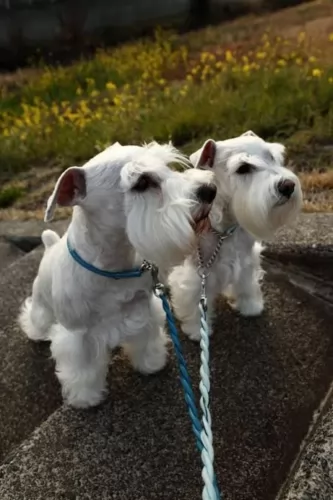 He is a low shedding breed so he will require a brushing just once a week. These dogs also have a certain professional grooming cut. Some schnauzer dog owners do stripping but this is mostly for show dogs.
He is a low shedding breed so he will require a brushing just once a week. These dogs also have a certain professional grooming cut. Some schnauzer dog owners do stripping but this is mostly for show dogs.
Most people just have them sheared to make it easy to groom them. Whether stripped or clipped, they nearly always have a beard and bushy eyebrows.
Trim your pet's nails and give him a general once-over during the grooming sessions to ensure all is well.
You White Schnauzer relies on you to make wise food choices for him. He will eat most things you offer him. That doesn’t mean you should as you can cause him to have a whole lot of digestive problems.
If you choose to give him commercially manufactured dog food, make sure its a high-quality one – devoid of toxic ingredients such as colorants, fillers and preservatives.
If you don’t know how to choose, your vet can show you the foods they have in stock and which would suit your pet best.
A little bit of home-made food now and then can also be good, but the food needs to be plain and simple to avoid abdominal pain. Boiled chicken brown rice and vegetables chopped up and added to the dry kibble occasionally can be a very good choice.